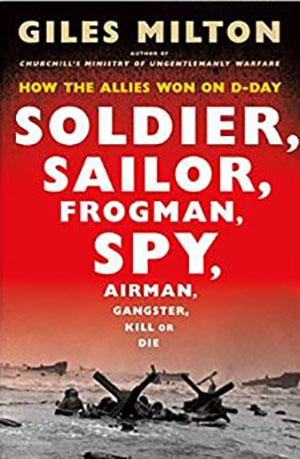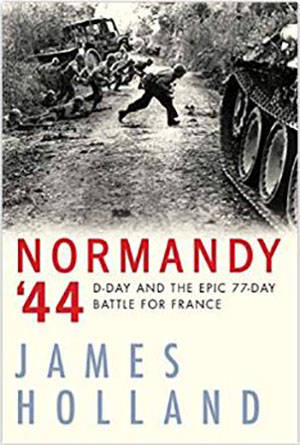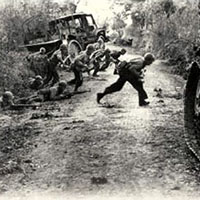— A book review by Jens Kruse —
This Thursday, June 6, 2019 marks the 75th anniversary of the allied invasion of Normandy in 1944. By way of remembrance and commemoration I read and would like to review for you two recent accounts of this momentous moment and phase of World War II.
Without the industrial might of the United States, the leadership of forward-thinking statesmen, the meticulous planning and execution of one of the largest and most complex military operations in history, the steadfastness of
commanding officers at all levels, but most of all the courage and sacrifice of the soldiers fighting on the ground this operation might have failed and the nationalist and fascist dictatorships of Nazi-Germany and Imperial Japan might have prevailed. Instead, its success and the subsequent victories in Europe and Japan opened the possibility for a world of liberty,
democratic societies, and economic development; a world anchored and supported by the transatlantic alliance, the European Union, and multilateral institutions; a world created and sustained in large part by the leadership and commitment of the United States.
The two books under review take different approaches to the momentous events that made these post-war developments possible.

Giles Milton, a British writer and historian, in his How the Allies Won on D-Day. Soldier. Sailor, Frogman, Spy, Airman, Gangster, Kill, or Die (New York: Henry Holt and Company, 2019), focuses entirely on the events of D-Day itself.
The “Preface” and “Afterword” very briefly sketch the events leading up to and following this day, but the 400+ text pages of the book narrate the preparation for and unfolding of the hours of this “longest day” (in the words of Cornelius Ryan’s 1959 book). The title of the British edition of this book is D-Day: The Soldier’s Story, a title which is descriptive of Milton’s approach. While political leaders and high-ranking military leaders make occasional cameo appearances in this book, the protagonists of the story are indeed the soldiers, sailors, airmen, and countless others who are at the front of the spear and are involved in the bloody and brutal fighting of this day (and many more to come).
And, indeed, Milton does not flinch from describing the horror of war in chilling detail. I will not reproduce here examples of these descriptions, but suffice it to say that reading them made me realize that even the Omaha Beach sequence of Spielberg’s Saving Private Ryan does not achieve full realism.
And yet this is an inspiring story. Relying on the accounts of survivors on both sides, their letters, diaries and other documents, Giles weaves a fine-grained and awe-inspiring account of the human spirit; of human’s capacity for fortitude, determination, endurance, ingenuity, courage and sacrifice. Without all of that, it seems to be Giles’ argument, the material superiority, excellent generalship, and quality civilian leadership would not have sufficed to prevail on that terrible day and in that terrible war.
It is therefore only proper that his book is dedicated “To all who served.”

James Holland, a British writer, historian and broadcaster, with
his Normandy ’44: D-Day and the Epic 77-Day Battle for France
(New York: Atlantic Monthly Press, 2019) has written a book that is very helpfully complementary to Soldier, Sailor ….
Holland’s book is broader in topic and methods. While its first two parts cover the preparations for D-Day and the actual day, the second two parts cover the entire 77-day battle for France of the subtitle: the subsequent grinding battle of attrition and the eventual breakout. While Holland, just as Milton, provides plenty of narrative from the perspective of the frontline fighters, he adds the analysis of a military historian. The book bristles with maps, lists of the German and allied orders of battle and the like.
Accordingly, Holland provides, at appropriate moments, comparative analyses of allied and German weaponry, and of the strengths and weaknesses of top military and civilian leadership. At one point, at the beginning of part IV, “Breakout,” he provides a fascinating essay entitled “A Brief Discourse on Weapons and the Operational Level of War.” In it, he seeks, persuasively, to debunk the persistent myth that the Germans, while overwhelmed by the allies in terms of quantity of weapons and materiel had the advantage of better quality of weapons, especially with respect to tanks. Perhaps even more interesting is the chapter “The Constraints of Wealth and the Freedom of Poverty.” Here, Holland explains that the very abundance of materiel enjoyed by the allies, their enormous firepower and deep support echelons made operations more difficult to organize, set up, and coordinate, which sometimes could make it seem that the allies were running a lumbering slow motion war whereas the Germans operated with swiftness and tactical dash. But the truth was that the allied way of war won out in the long run.
In this specific instance this was accomplished when, during the middle of August 1944, in a number of operations the allies break through, entrap much of the German army in Normandy in the Falaise pocket, defeat it decisively and drive on to Paris and the Rhine.

At the end of his “Postscript,” Holland writes:
“Not so long ago, I climbed up to Mount Ormel, the site of the end of the Normandy battle. It is a gorgeous spot. From this wonderful vantage point it was possible to see the entire Falaise gap laid out before me. It twinkled in the summery sun, a picture of tranquil beauty, of myriad fields, of small villages, church spires and lush farmland. It was almost impossible to believe that down below on the road just to the left of where I stood there had once been such terrible scenes of suffering and desolation. It was a reminder of the extraordinary regenerative power of the world in which we live, but also that we must look after it and remember how easily we can throw this haven back into turmoil.”
On June 6, 2019, 75 years after these momentous events, we must honor by remembering “all who served,” not just because without them we might not have had the privilege to live in a world of relative peace, liberal democracies, and liberty, but also because learning the lessons of history should teach us “how easily we can throw this haven back into turmoil.”









Eloquent reviews, Jens. Thanks for sharing. And may we learn to find other ways to solve the problems of the world.
Indeed.